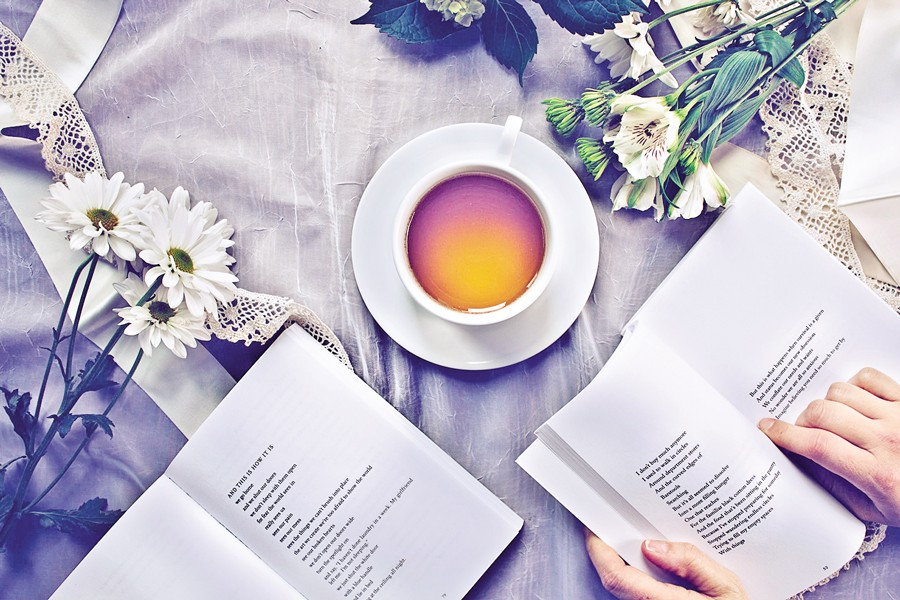
Published :
Updated :

In this era of modern technology, people are more into city life than enjoying the mystical language of poetry. It's not that city life doesn't collide with poetry, but people are now more stuck with their busy schedules than ever. Let's imagine two scenarios.
2000s. A house of five members, on the weekend; the two little kids are reciting and acting Bidrohi by Kazi Nazrul Islam; the mother is reading Shesher Kobita by Rabindranath Tagore while noting down the poetries by Labanya and Amit; the father is writing a poem and feeling nostalgic about his college days; in the meantime, the elder daughter is wondering how Robert Frost chose the less travelled road in 'The Road Not Taken.'
2020s. A house of four members, on the weekend; the sixth grader, daughter, is watching Korean Drama on Netflix; the twelfth grader, son, is watching either a teen American Drama or a Crime Drama on Netflix; the father is watching a documentary on Netflix; the mother is watching a rom-com on Netflix.
How did the scenario change a million miles in two decades? First of all, society has changed to a competitive race where people are running behind in their jobs or schoolwork more than ever, and on top of all, they are holding their breath all the time to catch up with the traffic jams all across the cities.
Just when they get some time to kill, they head over to streaming sites to unload their distressful week because they can't submerge themselves within the realm of the mystic river called poetry. After a stressful week, people do not have the sanity to think about poetry and go deeper within the words used in a poem; therefore, it becomes easy just to binge a show while doing other works simultaneously.
Still, is that all? Of course not. The country's education system has also created a mindset where students only run after memorizing topics and getting good grades; it's like the goal of education is fading away, the goal of having poetry in books is fading away, and everyone is just on that insane run.
On top of it, there is an idea all across the country that poetry wouldn't feed us, so all students are taking STEM (Science, Technology, Engineering, Mathematics) just for the sake of the future (when it is uncertain, obviously) and ignoring subjects of literature and poetries.
In this regard, a generation is growing up with the sensation of STEM without any passion; thus, on the one hand, the country is not getting true ardent learners in STEM, and there is no progress in research; on the other hand, people are forgetting poetry that keeps the hope of living further in this society.
To be dissolved in poetry, people need peace of mind, which they are not getting so far in this life full of technology. Cities do not have any place to hang around without restaurants or busy roads; the places we need to walk around to endear poetry are now a myth. That is why everyone is just binging shows on weekends; these people forget to enjoy life's true essence, and thus, poetry does not make sense to them.
In the '80s, even in the '90s, young adults used to write letters to loved ones, hiding from parents; they used literature in their letters; some passionate lovers even used to write poetry all day, recalling their loved ones. They recited poetry as the verses dripped off their tongue like honey.
Nowadays, young adults text, date, and forget about poetry or any literary medium to express their love. They go to restaurants instead of some barren field; they talk about Facebook, Instagram, and social media culture instead of talking about their feelings and reciting Lord Byron's romantic poems. Amit and Labanya from Shesher Kabita will never be born in this technical society; they were in the '70s, '80s, or perhaps even '90s.
Even in times of danger when young adults should stand against corruption, the '80s used to compose rebellious poems and recite them with the feelings underneath. Now, in the 2020s, people are only rebellious on social media. That's how the scenarios of everything have changed over these two decades.
This way, societies forget to read, write, recite, and feel poetry amid technicalities, complexities, and surface-level tension. Will there be light ever again?
khalidsaifullahkhanjuel@gmail.com


 For all latest news, follow The Financial Express Google News channel.
For all latest news, follow The Financial Express Google News channel.